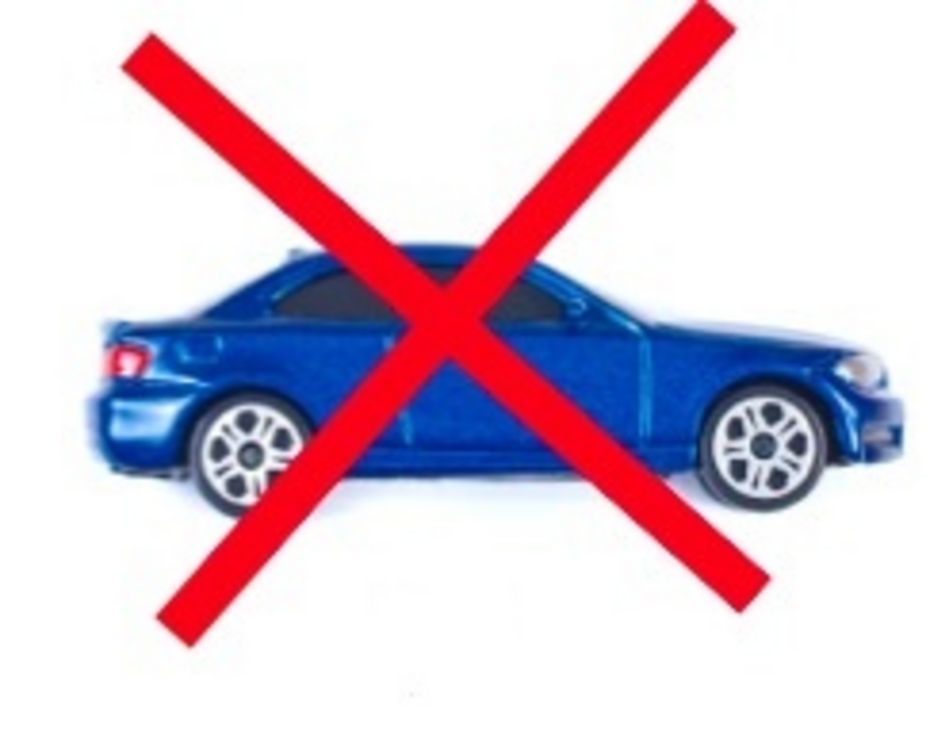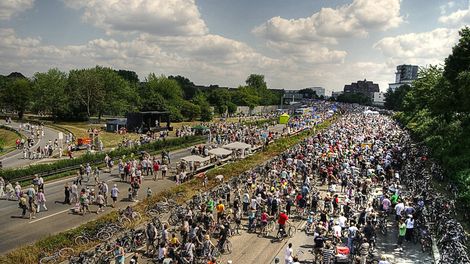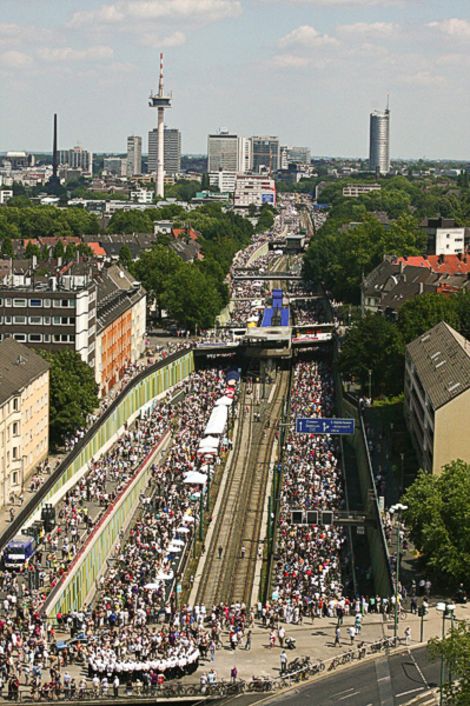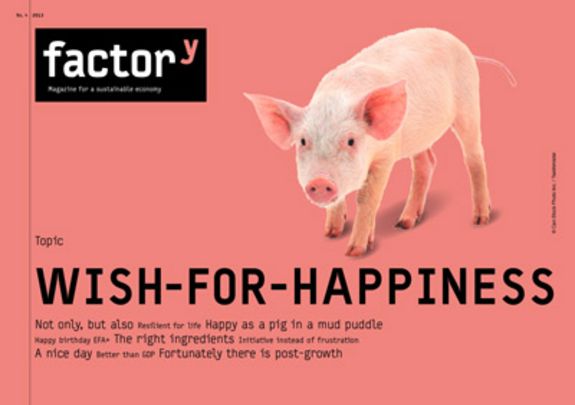Wish-for-Happiness

Streets filled with people instead of cars, happy faces, no rushing. Events such as the ‘Car-Free Sunday’ and the ‘Tag des guten Lebens’, a day celebrating the good life, made people’s genuine wishes come true, beyond their usual consumption habits.
By Davide Brocchi
Translated from the German by Inga Festersen, Eva Flucke, Ruthild Gärtner and Viktorija Tapai
A call for renunciation leads to a complete loss of approval. Therefore, it has to be presented as a gain in order to attract people’s attention on how to lead a resource-efficient life. Even then, people are sceptical about breaking old habits. But are renunciation and happiness really opposed to each other? The following brief outline describes the development of the Car-Free Sunday in several stages and shows that this assumption is fairly relative.
1973: The German Federal Government implemented four car-free Sundays as a response to the first international oil crisis. By closing the streets to motorised traffic, people were enabled to have entirely new experiences on the Autobahn throughout Germany. Whole families went for walks on the Autobahn, young people were roller skating, and senior citizens got on their bikes. Without traffic, the cities showed themselves in a completely different light. Those who were present at the time still look back fondly on the experience.
Since 2000, there have been several car-free Sundays in Brussels throughout the year. On the third Sunday in September, the entire city is closed to cars (161 square kilometres). Surveys have shown that the people’s satisfaction has been continually growing since the initiative was started. By now, 87 percent of the inhabitants consider the car-free Sunday to be a good or even excellent initiative.
2005: In the context of a representative survey by the city of Augsburg, 65 percent of its inhabitants advocated car-free Sundays in the city centre. Fifty-nine percent could see six of the car-free Sundays happening each year, 42 percent could even imagine having twelve. Only 22 percent of the respondents opposed the whole idea.
2010: Hardly any citizens complained on 18 July when the A40, the federal autobahn between Duisburg and Dortmund, was closed to cars and opened for visitors. Three million people accepted the invitation. They had breakfast together at long tables, made music and did arts and sports together – everything on the autobahn. The project ‘Still Leben – Ruhrschnellweg’ (still life – Ruhrschnellweg) became one of the most successful and impressive projects of the campaign ‘RUHR.2010 – Kulturhauptstadt Europas’ (European Capital of Culture).
2013: On 15 September, the first ‘Day of Good Life: Cologne’s Day of Sustainability’ took place. Ehrenfeld, a district in Cologne where more than 20,000 people live, remained closed to motorised traffic for one day. Entire streets were completely freed from cars by organising 1,000 alternative parking spaces for the residents. The public space was transformed into a wide ‘agora’. In an ancient Greek polis, an agora was the central place where direct democracy was created. There, the city’s politics, markets, and cultural life took place. According to the motto ‘more space for parks instead of space for parking’, greenery was planted on many car parks. People appreciated the non-commercial character of the event and the relaxed atmosphere in the spirit of deceleration. According to unofficial estimates by the police, between 80,000 and 100,000 people took part in Cologne’s ‘Day of Good Life’.
The response of the press was great. The daily newspaper Kölner Stadt-Anzeigercommented: “Cologne’s urban development policy needs more such stimuli – and many more Days of Good Life.” This day was organised by ‘Agora Köln’, a varied association of more than 91 citizen’s and environmental initiatives, companies, theatres, and further groups from Cologne which campaign for a stronger civic participation and for a progressive transformation of the city towards sustainability.
New forms of freedom
What do these examples show? It is certain that the limited availability of resources (e.g. crude oil), air pollution, noise pollution or the high consumption of space for car parks (i.e. for unused cars) require a change of thinking. The actual aim of car-free Sundays is the promotion of sustainable mobility – along with a reduction in the consumption of resources. Especially in cities with a high volume of road traffic such as Milan, Italy, or Bogotá, Columbia, they support health and environmental relief. In Brussels, Belgium, there is six to eight times less noise on car-free Sundays and the air in the city centre contains three to four times less nitrogen. In fact, in some streets, a nitrogen monoxide concentration ten times lower than on normal workdays was measured.
The popularity of car-free Sundays can hardly be explained by the environmental awareness of the population. The social and psychological side effects, however, are crucial. Especially in a car-friendly city, the suspension of motorised traffic has dramatic effects on the environment. The areas for cars and public transport become public space and create an area in which people’s longing for community, creative development, and alternative lifestyles are projected. This longing is also the result of progressive privatisation and commercialisation of the urban environment within the last few decades. Economic growth, mass consumption and faster cars no longer represent freedom, dynamism, and wealth, but they stand for blockage, traffic congestion and stress. Considering this background, abstinence is a form of self-protection, a requirement for being happy. Car-free Sundays offer – at least for a brief moment - the opportunity to escape the ‘mega-machine society’ as the American architecture critic Lewis Mumford († 1990) called it.
Happiness needs a strong democracy
In Germany, the popularity of car-free Sundays is a paradox in contrast to the high status of cars themselves. When the idea of the ‘Day of Good Life’ was presented to the meeting of a regional representation in Cologne, the reaction of the borough mayor, a member of The Greens, was as follows: “We shouldn’t ask too much of the citizens with visionary plans as such. A car-free street would be more realistic than a whole district.” Since nothing was sold and car-free days are considered to be bad for business, the German Chamber of Industry and Commerce and the city marketing had not supported the project, but even the ADAC, a German automobile club, approved the initiative. While abstinence is considered highly unpopular in political and administrative sectors, the success of car-free Sundays shows that most citizens are sometimes smarter than their political representatives.
Since social development is not determined by the citizens’ understanding of happiness, car-free Sundays remain a marginal phenomenon. In other words, happiness needs a strengthened democracy. According to the theory created by Elinor Ostrom, a US American political scientist and winner of the Nobel Prize in economics, common property is managed sustainably if its users cooperate and form small communities that act in a self-determined and autonomous manner. A project based on precisely these principles was organised in Cologne under the name Tag des guten Lebens (day of the good life). All neighbourhoods were allowed to ‘rule’ their own street for one day. Duties and responsibilities like cordoning off and cleaning the streets were assigned to the residents. The sharing strategy did not only lead to a significant decline of costs, but even made the project possible which was not within the financial means of the heavily indebted city. Residents stated that the assignment of responsibilities made them feel appreciated and that they enjoyed the volunteer work as a possibility for participation as well as a sign of equality in their neighbourhood.
Recapturing public spaces

Happiness is one of the rare goods that grow if you share them. “Since the Day of the Good Life,, it takes me 15 minutes longer to go to the bakery because I am constantly greeted by neighbours or because I stop to talk to them,” explains a resident of Cologne. The neighbourhoods that used to meet regularly to prepare that day have continued to meet, for example, to autonomously reorganise the nearby playground. Many people want to repeat the Day of the Good Life in their neighbourhood and are willing to take even more responsibility for organising it.
Anyone who has ever organised a car-free Sunday comes to the important conclusion that it is not essentially resources that are needed to organise a good life and sustainable alternatives, but open spaces for their realisation. The greatest challenges are the diversion of traffic, cordoning off and controlling the boundaries of car-free areas and the fulfilling of the numerous regulations concerning the use of public space by citizens. As soon as there is an open space, sustainability, community and the good life arise almost naturally. That was the impressive experience of 15 September in Cologne.
Davide Brocchi is a social scientist and a lecturer in sustainability at the ecosign-Akademie für Gestaltung (academy for design) in Cologne and at the University of Lüneburg, among other institutions. He initiated the project Tag des guten Lebens: Kölner Sonntag der Nachhaltigkeit (day of the good life: Cologne’s Sunday for sustainability).
Further reading:
Survey results and results of pollutant measurements regarding the car-free Sunday in Brussels
Citizen survey on the car-free day in Augsburg
More articles to the topics of happiness, wishes and the good life you will find either online or in our magazine Wish-to-Happiness. Finly illustrated and lightly readable on tablet-computers and screens the PDF-magazine contains all articles and pictures as well as additional numbers and quotatians.
Beiträge online
WISH-FOR-HAPPINESS

- Not only, but also
- Resilient for Life
- The right ingredients
- Initiative instead of frustration
- A nice day
- Zum Glück gibt es das Postwachstum
- Besser als BIP
Themen
- The Domino Effect: the Mobility Transition as an Engine for the ‘Great Transformation’
- Cities Use the Space
- Decarbonization by 2030
- The fear of biting the hand that feeds you
- Where investing is a pleasure
- Why divestment is going to change the world
- A Robin Hood tax for climate protection
- May the Force Be with Us
- Modern Strategies
- The prerogative of interpreting the future now lies with the companies involved in climate protection”
- From Negotiating to Trading Equitably
- Can a donkey be tragic?
- Rethink rather than rebound: a sufficiency revolution must precede the efficiency revolution
- On Rebound, Prebound and Performance Gaps
- So Let Us Seize Power Then!
- With Common Property Against Political Failure
- So Let Us Seize Power Then!
- The Comforting Beauty of Failure
- “It Is Not Impossible at All.“
- Resource-light shopping
- Men Have Not Stopped Giving the Advantage to Women – So Far
- Toothpaste for Princesses and Soup for Pirates
- It is about equality
- A nice day
- Initiative instead of frustration
- The right ingredients
- Resilient for Life
- Not only, but also
- Appreciation – more please!
- Worth more than money
- Learning to value the value of goods
- Worth and Values
- The Transformative Power of Science
- Historically effective: How innovation and technology transform
- The Disappearance of Products
- Growing Older 101
- Columbus’ Egg
- It Works! In Theory at Least ...
- What If...?
- Analysing Separately – Thinking and Acting Together!
- Let’s Break Away from Determined Breaking Points
- More Gold in Waste than in Mines
- The art of separation
- Should you really DIY?
- The Aesthetics of Do-It-Yourself
- Standing on One’s Own Feet
- From the handaxe to desktop fabrication
- Using Shares to Survive the Crisis
- When Citizens participate
- Possess to Participate
- The Right Growth at the Right Time
- Gunter Pauli and Blue Economy
- When Sustainability Grows
- How we treat Growth
- Illusions about Growth


